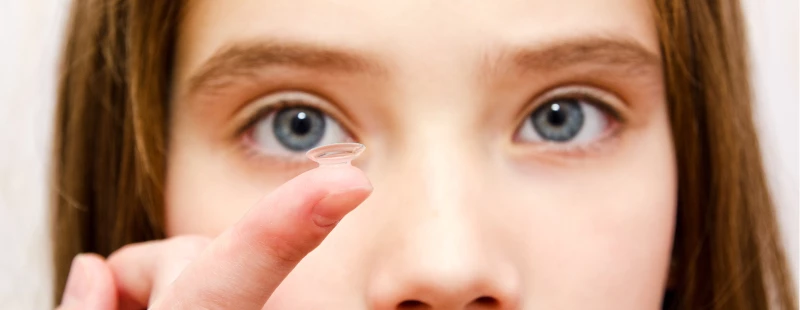At what age can a child start using contact lenses? Are they safe for the child's eye? Will the child be able to put them on and take them off by themselves? When will the lenses be a better option than glasses? These questions may bother any parent whose child would like to start an adventure with this popular alternative to glasses.
Contact lenses can be used occasionally from an early age, for example for medical purposes as a dressing, or for eye diseases such as congenital glaucoma. There is no specific age at which a child can start using contact lenses. If you are considering correction of your child's vision with lenses, you should think carefully about it, because the key factor here is not age, but individual predispositions.
Benefits of contact lenses in children
When properly fitted by a specialist, contact lenses allow good quality vision (they provide a larger field of vision than glasses). In this way, your child is not restricted by a frame and can see the object from the corner of their eye. What's more, lenses are perfect for sports. You don't have to worry that the glass will accidentally slip off the nose and get damaged. It is also safer in situations such as hitting a ball in a gym class.
At a school age, most young people are very concerned about their appearance. Sometimes, despite the wide choice of spectacle frames, they do not feel comfortable choosing this type of correction. With contact lenses, they can increase their confidence and forget about their visual impairment.

When to start using contact lenses?
Most people can start using lenses from their childhood or teenage years, but the most important thing is to use them responsibly. It is important that the child can apply and remove their own contact lenses, take good care of them and follow good hygiene guidelines. There should not be a situation where a young person is too tired to take their lenses out in the evening and goes to bed wearing them. It is vital that the child learns to touch the eyes and lenses only with thoroughly washed hands.
Lens care is a topic that needs a lot of attention. In the case of reusable lenses (biweekly and monthly), the child must remember to thoroughly clean both the lenses and the packaging they come in. With these lenses, it is a good idea to keep a record of when the lenses and solution have been opened and to remember to replace them on time. Of course, it should be the responsibility of the specialist you see to instruct and assist you in putting on your lenses for the first time. The role of parents is equally significant in ensuring that the child follows the recommendations of the optometrist or ophthalmologist. With daily lenses, good hygiene when touching the eyes, inserting or removing lenses is crucial.
Which contact lenses should I choose for a child?
Contact lens fitting requires a specialist eye examination. This appointment can be made with an ophthalmologist - a contactologist or an optometrist. It is there that the child's vision impairment as well as other eye parameters which are extremely important in the selection of lenses will be carefully checked (e.g., moisture in the eyes, corneal dimensions, health of the eyes and eyelids). The choice of lens replacement period depends on lifestyle, individual needs, eye condition and impairment. Daily lenses are preferable for occasional wear, and in the case of daily wear, regular disposable lenses such as bi-weekly lenses will be more convenient. The optimal solution is always matched during the examination with contact lens fitting.
It is also important to stay with the specific solution proposed by the specialist. The examination checks how the lens fits on the eye and whether it is healthy and safe for the eye. This is all the more important as each lens has different specifications, so not every lens will be right for every eye. Too loose, too tight, made of the wrong material - it will not only cause poorer vision, but can also damage the eye. That's why it's important to visit your eye care professional for check-ups and to consult them about any changes to your contact lenses type or replacement regimen.
It is important that the lens correction is chosen by a specialist.
Children can successfully wear lenses from an early age. Properly fitted and cared for will ensure absolute visual comfort without the risk of losing or scratching the glasses. What is more, children taught responsible handling of contact lenses care much more about hygiene while wearing them than adults starting their adventure with contactology. The basis of vision correction will always be glasses, but it is worth giving children the option to choose. With contact lenses they will be able to play and participate in all school activities more safely than with glasses.
By Sylwia Panas M.Sc. (NO19331)
Sources:
Grosvenor T. Wydawnictwo Elesevier Urban & Partner. Wrocław 2011
Gasson A., Morris J. Soczewki kontaktowe.Wydawnictwo Elesevier Urban & Partner. Wrocław
https://www.soczewki365.pl/content/42-od-kiedy-soczewki-dla-dziecka



